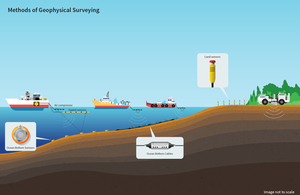Progress in GDF Siting Process: Marine Geophysical Surveys
RWM to carry out geophysical surveys to increase understanding of geology in coastal environments.

As RWM continues its discussions with communities about the siting process for a Geological Disposal Facility (GDF), a key issue emerging is that local people want a better understanding about whether their geology has any potential to safely host a GDF.
To build public confidence and better understand of the local geology being explored for a possible GDF, various environmental and geophysical investigations and surveys will be undertaken.
Following good progress in the siting process, non-intrusive marine geophysical surveys in coastal waters wherever Community Partnerships are formed can now be carried out earlier than originally envisaged.
Work to commission the surveys is under way and could start around summer 2022 as part of a continuing data-gathering process involving areas and times that we develop in partnership with each Community. RWM has already published the findings of a nation-wide geological screening exercise based on existing data. The marine surveys would provide significantly increased understanding of the deep geology in coastal environments.
Andy Parkes, Site Characterisation Project Director, said: “We’ll be acquiring data from previous surveys and also carrying out investigations using specialist vessels. Initially, we’re taking steps to ensure we have specialist contractors in place to carry out the surveys at the appropriate times.
“These surveys will deploy techniques that are routine in the oil, gas and offshore wind industries, similar to the ultrasound imaging that’s widely used in medicine.
“The surveys can generate three dimensional images of the deep geology, either below the land or below the seabed, providing information about the thickness, layering, and depths of the different rock types in particular geographical areas.
“The information obtained will help us to further consider the suitability of an area to host a GDF, which will in turn facilitate a more productive, informed dialogue with the communities that are at the heart of the siting process.”
It is anticipated that contractual arrangements will be finalised towards the end of 2021.
All marine activities will be subject to consultation with the maritime authorities, including fisheries representatives, and marine environment regulators.